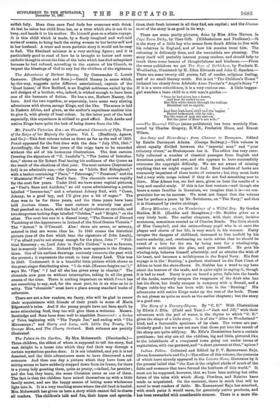Mr. Punch's Victorian Era, an Illustrated Chronicle of Fifty Years
of the Reign of her Majesty the Queen. Vol. I. (Bradbury, Agnew, and Co.)—This first volume takes us down as far as the end of 1859. Punch appeared for the first time with the date "July 17th, 1841." Accordingly, the Bret four years of the reign have to be recorded without the aid of his humorous illustrations. The first cartoon (bearing the signature of "B. Landells"), "The Letter of Introduc- tion," shows us Sir Robert Peel having his audience of the Queen as the result of the elections of that year. The next cartoon (September 3rd) is an admirable one,—the Queen as "Little Red Ridiughood," with a basket containing Place," "Patronage," "Pensions," and the "Ministerial Wolf" with Peel's face. The chronicle moves rapidly for the next few years. Under 1845 we have some capital pictures, as "Peel's Bane and Antidote," an old nurse administering a potion labelled "Income-tax," and a reluctant Johnny Bull, with "Come, Johnny, be a good boy, and I'll give you a bit of sugar." The dose was to be for three years, and the three years have been told fourteen times. The next cartoon is scarcely Ices good. Peel perched on a fence, with the bull of Agriculture on one side, and two dangerous-looking doge labelled "Cobden," and "Bright," on the other. The next but one is a dismal irony, "The Demon of Discord Vanishing at the Appearance in Ireland of the Good Genius Victoria." The "demon" is O'Connell. Alas! there are seven, or seventy, entered in that are worse than he. In 1846 comes the historical picture (one of the first which bear the signature of John Leech),
I'm afraid you're not strong enough for the place, John !" "Poli- tical Economy ; or, Lord John in Peel's Clothes," is not so famous, but is scarcely inferior. Richard Doyle now appears in the illustra- tions. One of his earliest drawings curionaly connects the past with the present; it represents the crush to hear Jenny Lind. This was in 1849. Underneath it is a beautiful little picture which shows us the great singer distributing alms. "I do wish (Heaven forgive me !)," says Mr. 'Pips,' "I had all she has given away in charity." The chronicle now goes on without interruption, taking in all the great events of the time. There is nothing important on which Punch has not something to say, and, for the most part, he is as wise as be is witty. This "chronicle" must have a place among standard books of ref erenoe.






















































 Previous page
Previous page